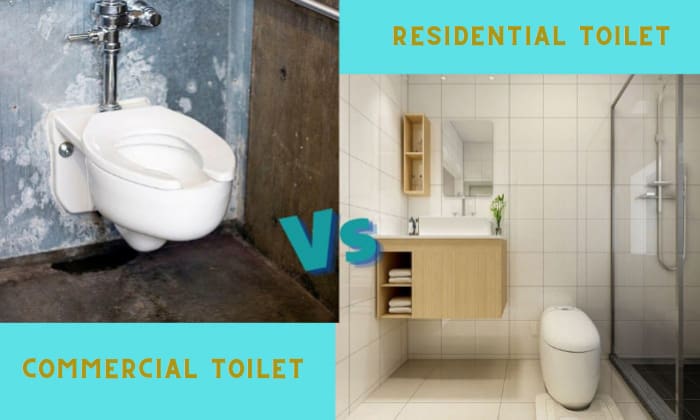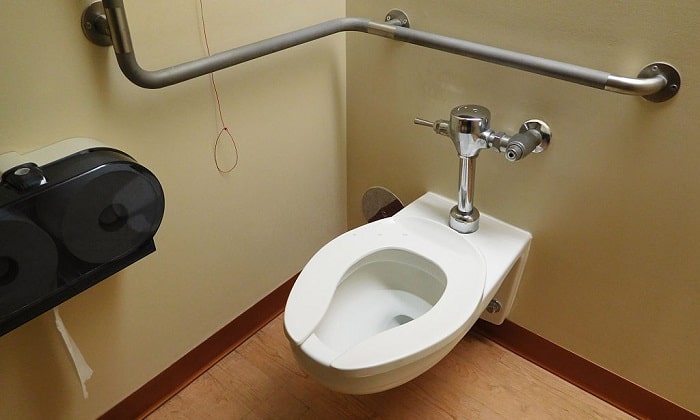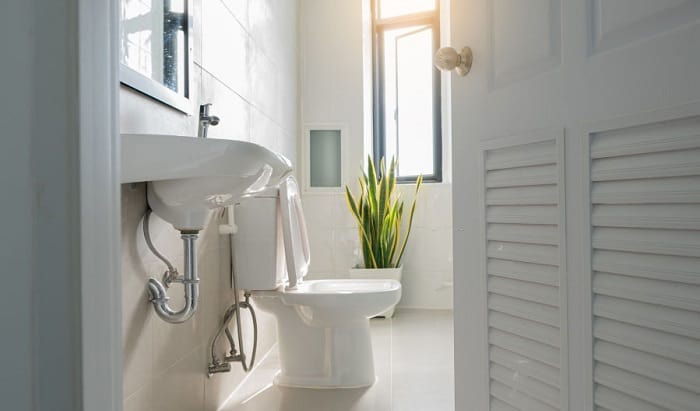Since the commercial toilet is sleek and tankless, many consider having it in their houses. Another thing to love about it is the bigger system compared to the residential one. It’s tempting to have it, but you need to make sure that your house can handle it.
Looking at commercial vs residential toilet, you need to look at the tube or the siphon. The force and type of water pressure in residential water supply has only 10 psi or pounds per square inch. There’s a high water pressure and large pipes on commercial toilets to let the water flow at a faster rate.
To know more about the plumbing of these toilets, read on. After being particular with the features, you can decide which works best for you.
Table of Contents
Plumbing: Commercial Toilet vs Residential
When comparing commercial toilets vs residential toilets, the plumbing system is the best part to look at. Commercial plumbing is used in various housing complexes and businesses. It involves a water supply system and extensive waste removal. In the case of residential plumbing, lines for water, heater, sewer, and other plumbing-related fixtures are provided.
Spotting the Differences
- Daily use
The daily plumbing in the commercial toilet is more significant than the residential one. It’s an essential feature due to the number of users. A residential toilet is made for a family, with fewer outlets and pipe fittings.
- Size and durability
The volume of commercial toilets requires large, high-grade, durable fixtures. Strain and pressure can’t easily break them down. There are smaller plumbing systems in the household system. It’s fine to add low-grade pipe fixtures as usage is not frequent.
- Difference of complexity
Residential plumbing is pretty simple as you can navigate the building without many hurdles. There’s complexity with a commercial toilet as there are several floors, multiple urinals, toilets, and sinks.
- The efficiency of the system
No plumbing system is perfect, but you need to get an experienced one when using a commercial toilet. The person you will hire should know commercial plumbing well. It needs to be done as a simple issue may lead to the destruction of the whole commercial plumbing system. Some repairs necessary on the residential toilet don’t create massive damage.
- Probable damage
Due to the complicated plumbing of the commercial toilet, it’s prone to complications compared to the residential one. The latter has a small system, so the damage is limited, and commercial plumbing can cover many floors. As a result, the damage turns into a disaster, affecting many parts.
- Drainage services
Drainage in the residential toilet is pretty straightforward. Unfortunately, it’s complex with a commercial toilet since numerous drain lines exist. Commercial toilet work requires checking every unit until the mainline.
More Comparison – Residential vs Commercial Toilet
- Flushing
The water flow should be at the ideal speed to complete the flushing. Commercial toilets comply with this because it releases necessary water volume and power. On the other hand, the residential toilet doesn’t have as much water volume. So, power is sometimes inadequate.
- Water storage
The water in the residential toilet is stored in a tank. When you flush, the tank water is pushed to the bowl and refilling follows. On the other hand, a commercial toilet operates with a water supply. Unfortunately, most houses cannot deliver water at high pressure and quick speed. It’s the reason why commercial toilet installation in some houses becomes a challenge.
Important Factors to Consider in Toilet Installation – Commercial vs Residential
1. The Right Toilet For Your House
The main difference between the commercial and residential toilets is the former doesn’t have a tank behind it. It’s one of the reasons why commercial toilets for home use are appealing to many. Who wouldn’t want to save some space and do less cleaning?
A tank behind a residential toilet is not an issue. The supply lines only come short as they’re not open to more powerful pressure. A residential toilet has a U-shaped tube or siphon that is placed upside down. This is the part that takes the waste and water from the bowl. When it happens, the water flows at a sufficient speed that fills up the tube.
The flushing power of a commercial toilet is from a direct water supply or electric pump. This power is a problem to houses that can’t put up with it. If the installation of a commercial toilet is still pursued in an unequipped house, massive damage can occur with a higher upfront cost.
2. The Limitation of Underground Plumbing
In a commercial toilet installation, an issue may arise from an underground pipe station or plumbing. The source of the water supply of the residential toilet is from its tank and it doesn’t travel in a lot of pipes. So, no bathroom clogs take place after a successful flush. The lines of the commercial toilet have a large diameter, with residential pipes, ½ or ¾ inch thick lines are enough.
If you operate a commercial toilet through the smaller pipes supposedly for a residential toilet, they will rupture and cause serious damage.
3. Tankless Toilet
If your house is not prepared for a commercial toilet, it doesn’t mean that you can’t go tankless. There are tankless toilet models compatible with residential plumbing, and you may only need to add a pump.
Examples of good tankless toilets are VOVO STYLEMENT, TRONE GETBCERN, and Kohler Veil. They’re a space-saver, so it fits even in limited bathroom space. However, they create more noise than regular toilet models.
Nonetheless, a tankless toilet has a sleek design and modern appeal. You should also know that it can’t work when there’s a power outage. It may not be for you if you live in an area with frequent power outages or electrical issues and storms.
Read more: What is the difference between a tankless toilet and a tank toilet?
A Realization to Ponder Upon
In commercial vs residential toilets, it can be helped to think that the former is awesome. But you have to consider the plumbing system available in your house. It must have pipes that are wide enough for a commercial toilet. If you wish to save space in your bathroom, you can choose a residential tankless toilet model. By all means, you can have the commercial toilet when your plumbing system allows you.

I’m Paulk Webb, and I work as a writer for Saveourwaterrebates. I’m happy to put in the time and effort to conduct market research to identify the most pressing issues faced by households concerning their plumbing. Feel free to check out our guides to get the most informed recommendations for how to solve your problems.




